October 15, 2024 | 20:06 GMT +7
October 15, 2024 | 20:06 GMT +7
Hotline: 0913.378.918
October 15, 2024 | 20:06 GMT +7
Hotline: 0913.378.918
In the context of climate change and the need for sustainable development, agricultural waste has become a valuable resource rather than a burden on the environment, if properly utilized.
Professor Deng Wen-Ling from National Chung Hsing University in Taiwan believes that researching and proposing potential solutions for recycling agricultural waste is essential to promote a circular economy in agriculture and reduce greenhouse gas emissions.
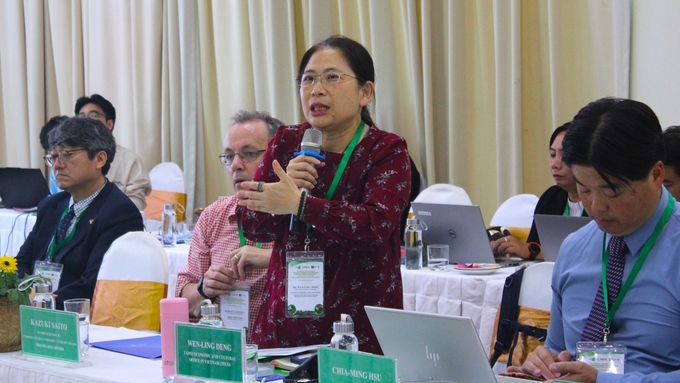
Professor Deng Wen-Ling (National Chung Hsing University, Taiwan) shares solutions for converting agricultural waste into valuable biomass. Photo: Kim Anh.
According to Professor Deng Wen-Ling, agricultural waste includes organic and inorganic materials that are discarded during the processes of cultivation and livestock farming, such as stems, straw, leaves, husks, livestock waste, food scraps, agricultural chemicals, and packaging used in production and supply chains.
In Asia, agricultural production plays a key role in providing employment and income for people; however, this activity generates a significant amount of waste.
According to statistics from the Food and Agriculture Organization (FAO), in 2023, rice cultivation in ASEAN countries, including the Philippines, Thailand, Cambodia, Vietnam, Myanmar, Laos, Indonesia and Malaysia, accounted for 7% to 64% of total agricultural emissions in each country.
Meanwhile, in Thailand, Indonesia, the Philippines and Vietnam, millions of tons of rice are produced each year, generating 38 million tons of husks and 34 million tons of bagasse. This situation highlights the urgent need for effective management and recycling of agricultural waste.
From Taiwan's experience, Professor Deng Wen-Ling notes that many solutions have been implemented to transform agricultural waste into high-value-added products.
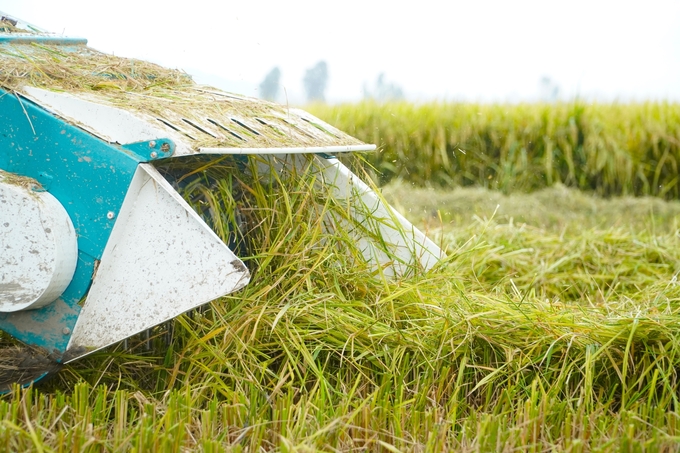
Rice cultivation is one of the agricultural production activities that generates a significant amount of greenhouse gas emissions. Photo: Kim Anh.
Notably, the method of composting organic fertilizer using TTT technology is a promising solution developed by Professor Chiu-Chung Young.
This technology employs TTT enzymes to carry out decomposition, synthesis, conversion, and polymerization reactions. Harmful substances in organic agricultural waste are detoxified and deodorized through various steps.
The advantage of this technology lies in its short processing time for organic waste and rapid turnover rate. Pathogens, insect eggs, and weed seeds are eliminated at a temperature of 80°C within 30 minutes. Within 3 hours, through the heating process, pathogens are eradicated, resulting in organic fertilizer while saving storage space and significantly reducing greenhouse gas emissions (CO2, CH4).
Research institutions in Taiwan have assessed the effectiveness of this technology, and the results indicate that: Soil treated with organic fertilizer produced from TTT technology shows a significant increase in fertility, with crop yields rising by 206%, double that of some other fertilizers (which yield only 100% to 183%). This method promises safety and is expected to be widely applied in agriculture in the near future.
Another method is the mechanical conversion to solid renewable fuel through a pelletizing process. This technology has been demonstrated in Guanshan Township, Taitung County (Taiwan), a region renowned for its ecosystem conservation.
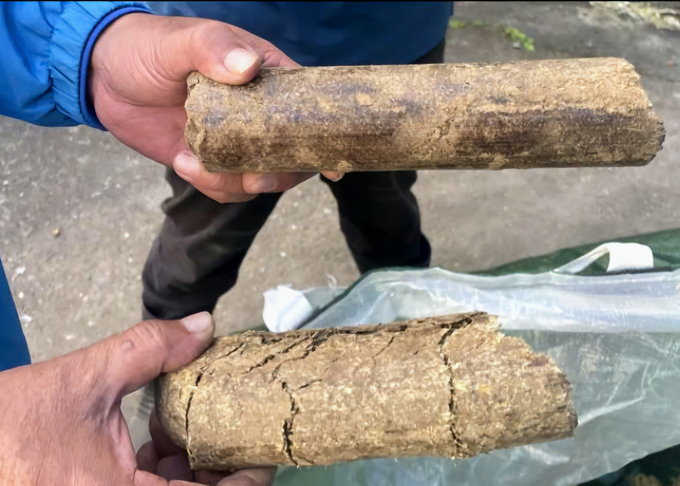
Instead of leaving straw in the fields, the people of Guanshan (Taiwan) use technology to grind, dry, and compress straw into pellets for fuel. Photo: Kim Anh.
The people of Guanshan cultivate rice on a very small scale (about 50 ha/year), with an annual collection of 600 tons of straw. Instead of leaving the straw in the fields, they use mechanization to collect, grind, dry and compress it into pellets for solid renewable fuel.
The pellets produced from straw are easy to store, convenient for transportation, and safe to use, with a ignition temperature reaching 300°C.
Notably, using straw pellets generates fewer emissions compared to coal, as the actual thermal yield of this fuel is 3.298 kcal/kg, which is only about 56% of coal's yield (5,890 kcal/kg), thus minimizing the amount of straw that needs to be stored.
However, Professor Deng Wen-Ling believes that the technology for producing pellets from straw has only been implemented in a few small rural areas, and therefore, solutions are needed to scale it up. In other countries, this could be achieved through community organizations such as farmers' groups or cooperatives to collect straw, providing additional income for farmers.
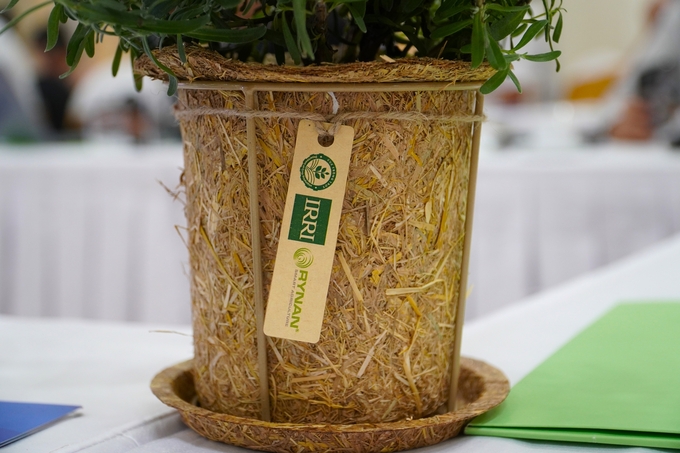
One of the handcrafted products made from straw. Photo: Kim Anh.
In addition, Taiwan has developed biocomposting technology to transform agricultural waste into ecological materials (low carbon, biomass, renewable), such as biodegradable plastic bags, bioplastics, footwear, clothing, food containers, and utensils.
These technologies not only maximize the utilization of agricultural waste but also provide economic value to other industries, such as packaging and even medical equipment.
Translated by Phuong Linh
/2024/10/15/5420-2-181755_908.jpg)
(VAN) 'In recent times, our agricultural sector has faced many problems in the development process,' said Mr. Vu Manh Hung, Chairman of Hung Nhon Group.
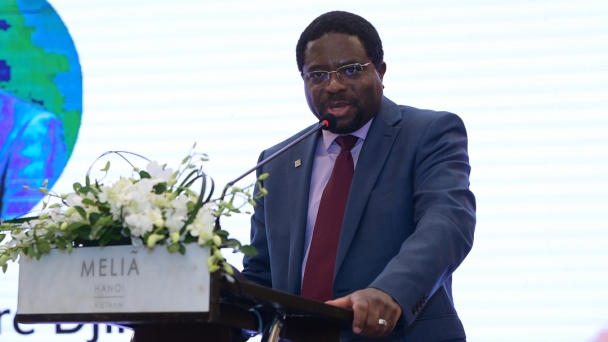
(VAN) International Livestock Research Institute (ILRI) anticipates that the 2024-2030 strategy, which was introduced during its 50th anniversary celebration, will strengthen assistance to people.
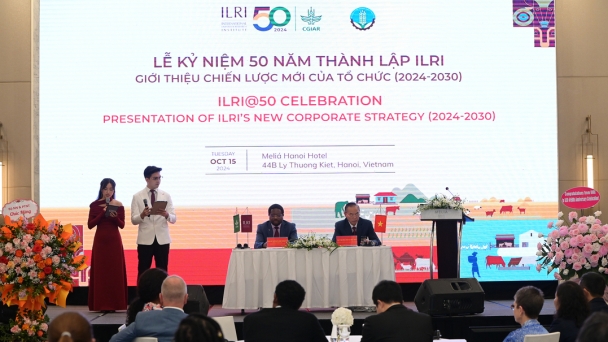
(VAN) On October 15, the International Livestock Research Institute celebrates 50 years and launches a new strategy for sustainable livestock development.
/2024/10/15/4316-1-133505_52.jpg)
(VAN) Phuoc Hao Agricultural Cooperative (Phuoc Hao commune, Chau Thanh district) has just been granted VietGAP certification for an area of 51 hectares of rice of 46 farmer households.
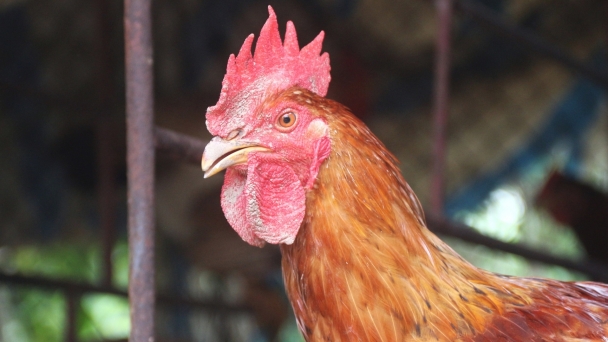
(VAN) The livestock sector in Thai Nguyen will be able to develop sustainably in the context of international integration by implementing technological advancements in actual production.
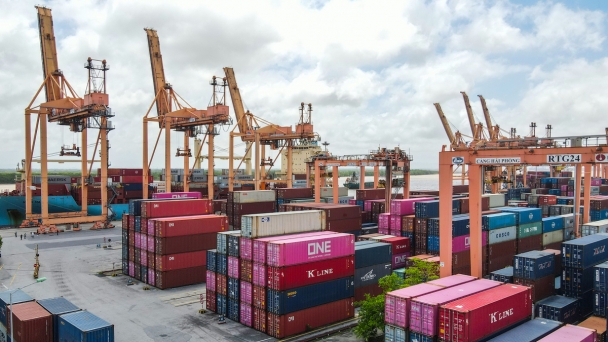
(VAN) After third-quarter GDP exceeded forecasts despite the impact of Typhoon Yagi, HSBC raised Vietnam's growth forecast from 6.5% to 7%.